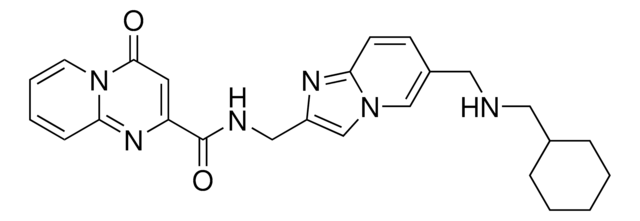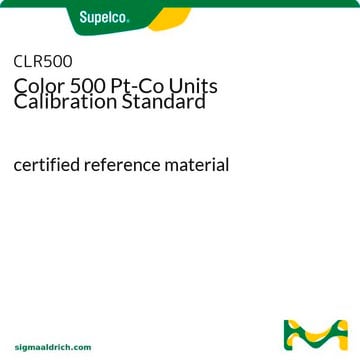Recommended Products
biological source
Serratia marcescens
Quality Level
form
solution
specific activity
10000 U/mL
packaging
pkg of 1,000 U (10220566001 [10 U/μl])
pkg of 5,000 U (10656348001 [10 U/μl])
pkg of 5,000 U (11047639001 [40 U/μl])
manufacturer/tradename
Roche
concentration
<0.1 % (w/w)
parameter
25 °C optimum reaction temp.
technique(s)
electrophoresis: suitable
color
colorless
pH
7.0 (39 °F)
solubility
water: miscible
suitability
suitable for molecular biology
application(s)
life science and biopharma
foreign activity
Endonucleases, none detected (up to 20 U with lambda-DNA)
Endonucleases, none detected (up to 20U with pBR 322-DNA )
shipped in
dry ice
storage temp.
−20°C
Related Categories
General description
Specificity
*C °C*CGGG
Restriction site: *C °C*C↓GGG
*C °C*C↓GGG
Heat inactivation: Sma I can be heat inactivated by incubation at 65 °C for 15 minutes (up to 100 U/μg DNA).
Application
Quality
1μg λDNA is incubated for 16 hours in 50μl SuRE/Cut Buffer A with an excess of Sma I. The number of enzyme units which do not change the enzyme-specific pattern is stated in the certificate of analysis.
Absence of exonuclease activity
Approximately 5μg [3H] labeled calf thymus DNA are incubated with 3μl Sma I for 4 hours at +37°C in a total volume of 100μl 50mM Tris-HCl, 10mM MgCl2, 1mM Dithioerythritol, pH approximately 7.5. Under these conditions, no release of radioactivity is detectable, as stated in the certificate of analysis.
DNA Profile
- λ: 3
- φX174: 0
- Ad2: 12
- M13mp7: 0
- pBR322: 0
- pBR328: 0
- pUC18: 1
- SV40: 0
Unit Definition
Storage and Stability
Analysis Note
Sma I generates ends that are compatible with any blunt end.
Isoschizomers
The enzyme is an isoschizomer to Cfr9 I, PspA I, Xma I, and XmaC I.
Methylation sensitivity
Sma I is not inhibited by 5-methylcytosine at the middle of the three C residues (°) in the recognition sequence. However, the activity is inhibited by 5-methylcytosine at the other Cs (*) or 4-methylcytosine in any position within the recognition sequence (*C°C*C↓GGG).
Incubation temperature
+25°C
PFGE tested
Sma I has been tested in Pulsed-Field Gel Electrophoresis (on bacterial chromosomes). For cleavage of genomic DNA (E. coli C 600) embedded in agarose for PFGE analysis, we recommend 10 U of enzyme/μg DNA and 4 hour incubation time.
Ligation and recutting assay
Sma I fragments obtained by complete digestion of 1μg λDNA are ligated with 1U T4 DNA Ligase in a volume of 10μl by incubation for 16 hours at +25°C in 66mM Tris-HCl, 5mM MgCl2, 5mM Dithioerythritol, and 1mM ATP, pH 7.5 (at +20°C) resulting in >80% recovery of 1μg λDNA fragments.
Subsequent re-cutting with Sma I yields >80% of the typical pattern of λDNA × Sma I fragments.
The buffer in bold is recommended for optimal activity
- A: 100%
- B: 0-10%
- H: 0-10%
- L: 0-10%
- M: 0-10%
Relative activity in PCR mix (Taq DNA Polymerase buffer) is 100%. The PCR mix contained λDNA, primers, 10 mM Tris-HCl (pH 8.3, 20 °C), 50 mM KCl, 1.5 mM MgCl2, 200 μM dNTPs, 2.5 U Taq DNA polymerase. The mix was subjected to 25 amplification cycles.Activity in reaction buffer of Pwo SuperYield DNA Polymerase PCR Mix is 100%. If supplemented with GC-RICH Solution, activity remains at 100%. Pwo SuperYield DNA Polymerase PCR Mix is not available in U.S.
Other Notes
Kit Components Only
- Enzyme Solution
- SuRE/Cut Buffer A 10x concentrated
Storage Class Code
12 - Non Combustible Liquids
WGK
WGK 1
Flash Point(F)
does not flash
Flash Point(C)
does not flash
Choose from one of the most recent versions:
Already Own This Product?
Find documentation for the products that you have recently purchased in the Document Library.
Articles
The term “Restriction enzyme” originated from the studies of Enterobacteria phage λ (lambda phage) in the laboratories of Werner Arber and Matthew Meselson.
Related Content
Restriction endonucleases in prokaryotes function primarily to protect against foreign genetic material, notably bacteriophage DNA.
Restriction endonucleases in prokaryotes function primarily to protect against foreign genetic material, notably bacteriophage DNA.
Restriction endonucleases in prokaryotes function primarily to protect against foreign genetic material, notably bacteriophage DNA.
Restriction endonucleases in prokaryotes function primarily to protect against foreign genetic material, notably bacteriophage DNA.
Our team of scientists has experience in all areas of research including Life Science, Material Science, Chemical Synthesis, Chromatography, Analytical and many others.
Contact Technical Service







